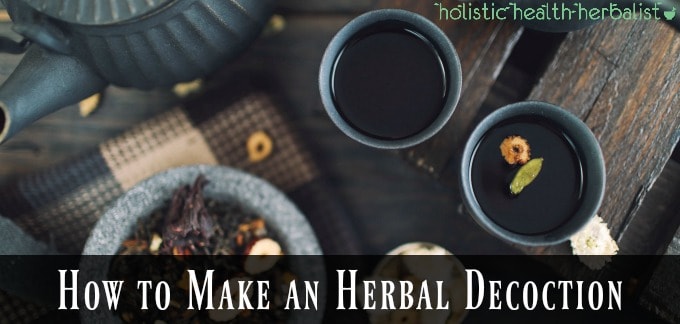
Learning how to make an herbal decoction is a useful skill when dealing with tough roots, herbs that don’t contain volatile oils or herbs that need a bit more coaxing to release their medicinal components.
They make handy preparations when children or animals need herbal remedies since it’s difficult for them to sit still or drink large quantities of infusion. Making a more concentrated remedy that can be taken in by the tablespoon is the perfect way to get these nourishing herbs into our bodies.
The Power of an Herbal Decoction
Infusions are usually made with softer plant material that requires a long steeping time to extract their vitamins, minerals, and medicinal properties.
What is a Decoction?
Decoctions are herbal preparations that are made by boiling fresh or dried herbs in water for long periods of time, usually a few hours, in order to extract their water-soluble constituents.
The traditional method used for making a simple herbal decoction is to simmer the herbs until the liquid is reduced by half.
Decoctions are a key when making herbal syrups and fomentations (poultices) and is the method I use when making my elderberry syrup recipe. The medicinal constituents are concentrated and potent and lend themselves well to those who despise taking larger quantities of medicine.
What is a Double Decoction?
A double decoction is an herbal decoction reduced to ¼ the amount of liquid that was used. If you began with 1 pint of water, a double decoction would yield ½ cup of liquid.
How to Make an Herbal Decoction
The herbs of choice should be cut or ground in order to make extraction easier. Tough dry roots should be soaked up to 12 hours before bringing them to a boil (using the soaking water).
Dried leaves and other plant material should be ground coarsely, while fresh herbs should be cut, sliced, or lightly crushed to help extract their medicinal qualities.
The Best Water for Decoctions
As always, distilled is best when making herbal preparations. However, spring water can be used.
Do not use tap water since it has other stuff and flavors in it you don't want in your medicine.
Decoction Vessel
Glass, earthenware, or porcelain cooking pots are best when preparing an herbal decoction. Metal pots or pans may react with astringent herbs and cause a rather yucky tasting and discolored preparation and is not recommended.
Can you Store an Herbal Decoction?
Ideally, herbal decoctions should be used immediately after making them or at least within the first 24 hours for maximum benefit. You can however, keep them tightly sealed in the refrigerator for up to three days, but their potency will really start to decline after the first day. Try not to make large batches of decoctions if their quantity cannot be consumed soon after making them for best results.
If longer storage is needed add 1 TB of brandy for every ½ cup of herbal decoction. For 1 pint of decoction, add 4 TB of brandy. The shelf life should increase by at least a few days, though some herbalists say they can last for up to a year.
You can also freeze your decoctions as long as they don't contain alcohol for easy use. One ice cube equals one adult dose and can be melted in tea if desired.
Decoction Dosage
The strength of a decoction is 4 times that of an herbal infusion, where the strength of a double decoction is 16 times stronger.
In general, most people of good health and constitution can consume 1 cup of decoction three times a day. Of course, dosage really depends on the health, constitution, size, and age of the person taking them.
The dosage for a double decoction is 1 TB for adults and ½ teaspoon for children depending on the herb used.
How to Prepare an Herbal Decoction
• Measure out 1 oz of dried or fresh herb (use more of these sense fresh herbs contain water and can dilute the end product) and place it in your cooking pot that is NON-reactive metal
• Pour in 1 pint of cold water - beginning with cold water is very important in order to completely extract an herb’s properties.
• Let the herb soak for a few hours in cold water (for roots up to 12 hours)
• Cover the cooking pot with a lid and bring the herbs to a slow boil
• Once the water comes to a boil, bring down to a simmer, and simmer for at least 15 minutes. The harder the plant material, the longer it needs to simmer. I like to simmer a decoction until the liquid has reduced by ¼ to ½ the original amount. It takes about 1 hour to reduce a decoction by ½.
• After you have reached the desired strength, strain the herbs from the liquid. Make sure to really squeeze out as much as possible.
• Pour into a clean pint jar and store it in the fridge.
Depending on what you make, add 1TB of prepared decoction and add it to hot chocolate, chai tea, or homemade cider to add extra vitamins. minerals, and immune boosting qualities to your favorite drinks.
Herbs that Work Well for Decocting
Each herb listed below can be taken in 1 cup serving 3 times a day using the 1 oz of herb to 1 pint of water method.
• Ashwagandha
• Astragalus
• Blackberry root
• Black cohosh
• Cardamom
• Chaga mushroom
• Chicory
• Cinnamon bark
• Cordyceps
• Coriander
• Crampbark
• Dandelion root (up to 30 min.)
• Echinacea
• Elderberry
• Eleuthero
• Ginger
• Ginseng
• Hawthorne
• Kava
• Marshmallow root
• Milk thistle
• Mullein
• Reishi mushroom (45 min-1 hr)
• Rose hips
• Schisandra berry
• Slippery elm
• Turmeric
• Vitex
• Wild cherry bark
• Wild yam
• Willow Bark
• Yellow dock root
Have you ever made herbal decoctions? Please share your favorites in the comments below!
You may also enjoy reading:
How to Make an Herbal Infused Honey
How to Make Herbal Vinegar
How to Make Your Own Herbal Deodorant
How to Make an Herbal Infusion
How to Make Nourishing Herbal Infusions
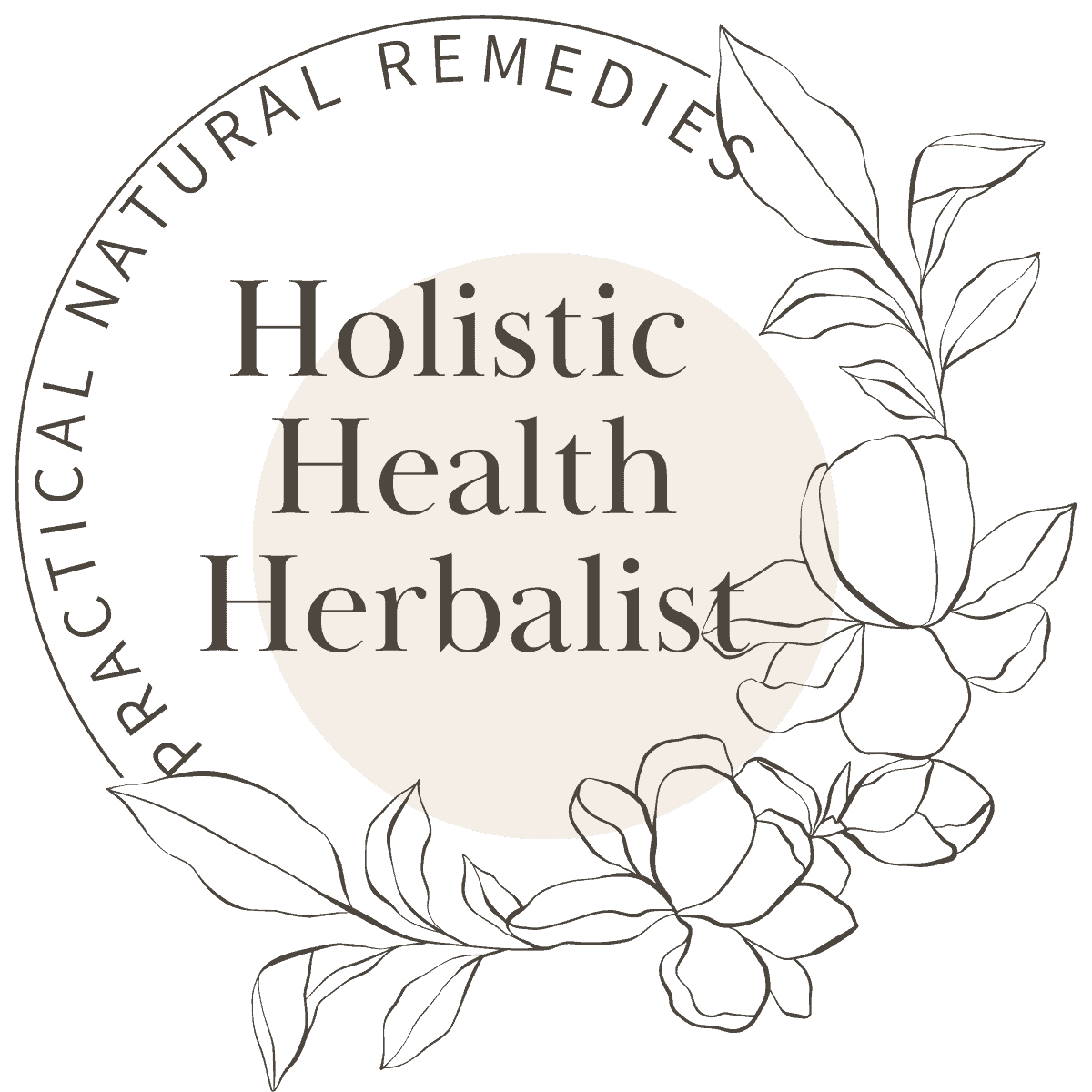

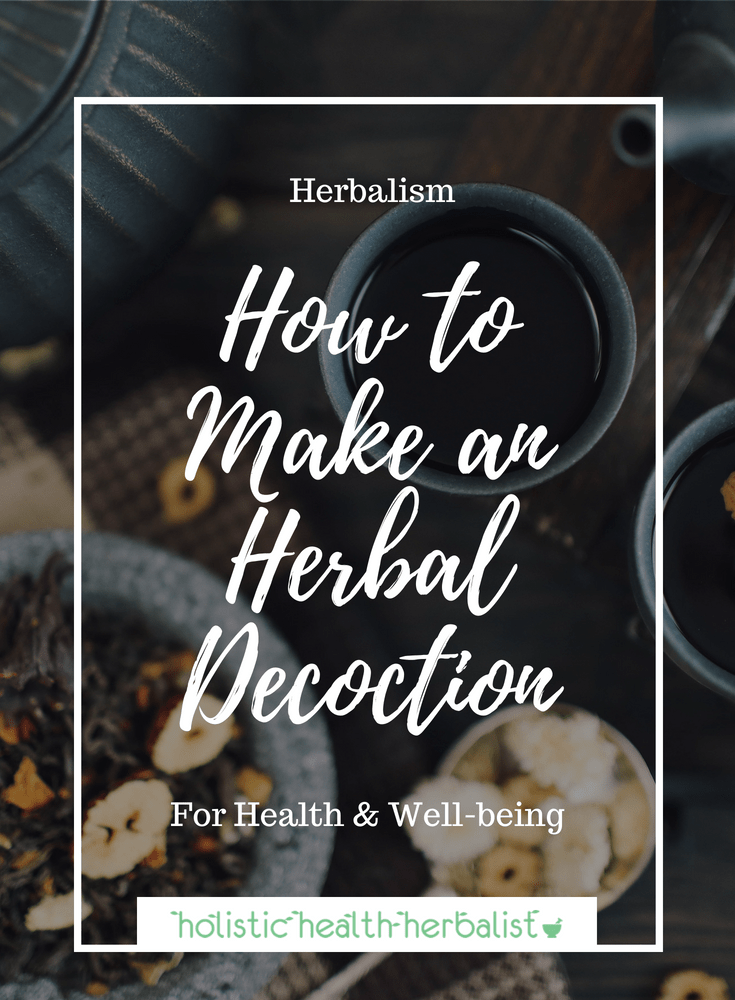

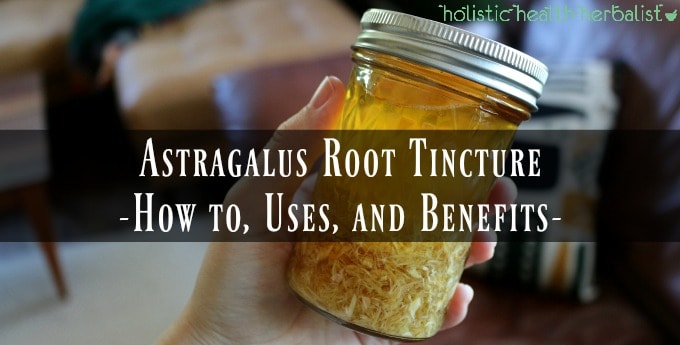
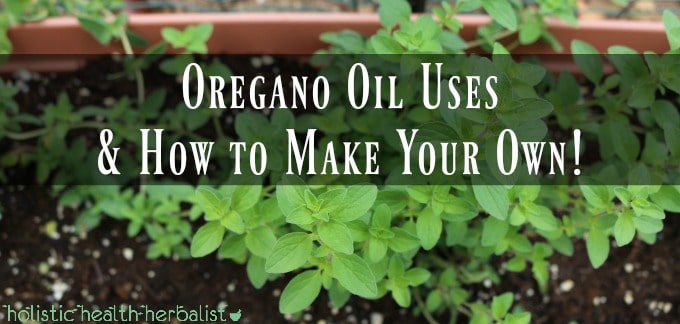
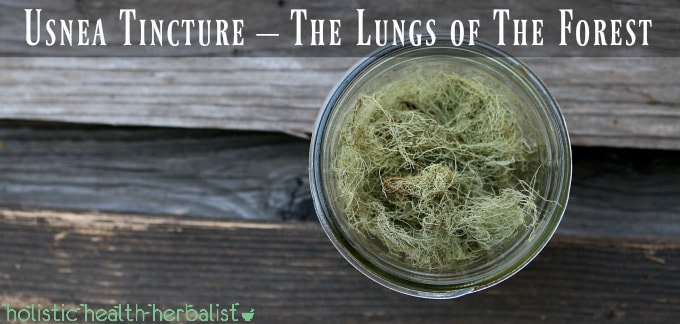
Dinesh Kumar Gupta says
How to make different types of herbal decoction for different deseases..such as constipation , depression ,obesity etc.
Frank young says
Hi
I am using SliperyElm (as a powder ) for a cup of boiling water one tablespoon Slipery Elm. Any thoughts?
Thanks, frank
Tash says
Might get a bit slimy but otherwise fine! Be sure to keep the decoction in the fridge for freshness.
Just Wendy says
Hi Tash,
Thanks for sharing this info. I do, however, have a question about your recommendation of Mullein being used for a decoction. Are you talking about Mullein ROOT? Or Mullein leaf?
I was of the understanding that decoctions were to be used for roots, barks, and seeds; basically "hard" substances. Infusions, on the other hand, were to be used for "soft" herbal materials like leaves and flowers.
Since it is generally Mullein leaf or flower that is used, I'm wondering why you would use a decoction?
Thanks in advance for your comments.
Wendy
Tash says
Hi Wendy!
Typically, harder materials are better suited for decoction so yes you are correct! Mullein root would be great for this method and is used for toning the urinary tract and as an effective expectorant 🙂
Just Wendy says
Hi Tash,
Thanks for the clarification. But getting back to Mullein LEAF: Because the leaves are so bulky and thick, would you maybe choose to do an optional decoction from the leaves too for a stronger result? Or would you stick with the general guideline of infusions for materials like leaves and flowers?
I'm especially eager to know because I'm dealing with a nasty case of flu/bronchitis that has been going around in this area (North West Nevada, USA) and I am in desperate need of herbal relief! We have lots of wild mullein growing nearby, so I harvested some and made a strong infusion that I've been adding (~ 15 ml) to Breathe Easy by Traditional Medicinals. If using the root would be the better way to go, I'll sure go dig some up right away and get started. I just need some guidance on a good herbal expectorant.
Thanks in advance for any additional information you can offer.
Wendy
Tash says
Hello again!
You can definitely decoct mullein leaf! Any form of decoction will result in a more concentrated medicine and is faster than the infusion method. Make sure to decoct the herbs covered to keep in volatile oils. Just be sure to strain it very well and you're good to go 🙂